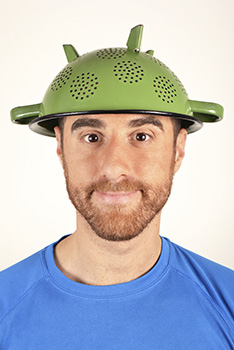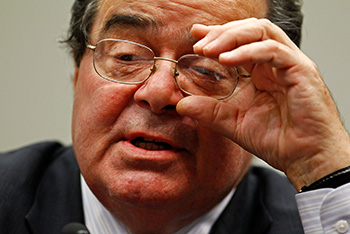 From the Archives
From the Archives
Luck of the Irish
March 17 is Saint Patrick’s Day, so this is a good time to tell the story of Curran v. Lee, a 1973 case out of Connecticut.
In that case, resident John Curran sued to block the mayor and the city of New Haven, on constitutional grounds, from holding the St. Patrick’s Day Parade. The case went to the U.S. Court of Appeals for the Second Circuit, which had this to say:
“Curran would have us hold that any aid by New Haven to the St. Patrick’s Day parade is an unconstitutional act respecting an establishment of religion merely because St. Patrick is known as an apostle of the Roman Catholic faith. This we cannot do. The practice of honoring St. Patrick may be rooted in religious belief, but a parade named after him is not necessarily a religious procession. It is quite possible that the parade has evolved into a secular celebration by Irish-Americans and their friends.”
Source: Fastcase
By the Numbers
$2,500
– The amount a Florida law firm paid to “ransomware” hackers to recoup its digital files.
Ransomware lurks in emails. Once opened, the infection locks digital files through encryption. The only way to get them back is to pay the ransom, through untraceable bitcoins, or restore the files from back-up systems.
Thus, it is crucial to have security measures that block these types of emails from coming into the network and to have proper back-up systems in place.
Recently, a ransomware variant called “Locky” is running rampant. It is transmitted through Microsoft Word documents attached to emails that claim to be invoices. Because the virus can also infect cloud-based storage locations, it is advisable to store critical data on separate drives.
 If you have security-related questions, contact Practice 411™ – the State Bar of Wisconsin’s Law Office Management Assistance Program – at practicehelp@wisbar.org or (800) 444-9404, ext. 6012.
If you have security-related questions, contact Practice 411™ – the State Bar of Wisconsin’s Law Office Management Assistance Program – at practicehelp@wisbar.org or (800) 444-9404, ext. 6012.
Source: Practice411™ elist; The Daily Record, Jacksonville
Out There
Pastafarian Can Wear Colander in DMV Photo
A Wisconsin man who is a member of the Church of the Flying Spaghetti Monster wanted to wear a colander on his head in his driver’s license photo. At first, he was denied.
But then his lawyer, Derek Allen, sent a convincing letter to the Wisconsin Department of Transportation (DOT). It noted regulations that allow license applicants to wear religious head coverings so long as a full facial image is not blocked from view.
“Pastafarians in Utah, Texas, and Massachusetts have all been allowed to don colanders in their identification photos, as have Pastafarians in Austria, Russia, and the Czech Republic,” Allen wrote. “As a Wisconsin resident, it is disheartening to imagine the possibility that my civil liberties – particularly my ability to freely practice my religion – would be better protected in [places other] than here in Wisconsin.”
The DOT responded with a letter that said Wisconsin DMV Centers were advised to recognize colanders as religious head coverings.
Source: Venganza.org; tmj4.com
 Quotable
Quotable
“If it was up to me, I would have thrown this bearded, sandal-wearing flag burner into jail.
But it was not up to me.”
– U.S. Supreme Court Justice Antonin Scalia, noting that flag-burning is protected by the First Amendment, regardless of how reprehensible it is.
Justice Scalia, after serving three decades on the Court, passed away on Feb. 13, 2016. President Ronald Reagan appointed him to the U.S. Supreme Court in 1986 and the Senate unanimously confirmed.
Source: 60 Minutes; New York Times
Tech Tip
Researching New Technology? Start at the Wirecutter
Researching new technology can be a frustrating, time-consuming process.
Online reviews can be outdated, and “best” lists often are not comprehensive, says Tison Rhine, State Bar Practice411™ advisor.
 “But, if you like to do your own research, I recommend, as your starting point for finding the best tech products currently available, thewirecutter.com.”
“But, if you like to do your own research, I recommend, as your starting point for finding the best tech products currently available, thewirecutter.com.”
The Wirecutter (which, by the way, did not pay Rhine to say this) offers the most comprehensive, up-to-date, and consistently well-organized product recommendations of any website he has found. It covers a wide range of gadgets and gear – including laptops, hard drives, backup software, presentation projectors, printers, Wi-Fi routers, wireless carriers, surge protectors, office chairs, and much more.
“Most of all, the reviews are consistently helpful. I find myself agreeing with the Wirecutter’s conclusions far more often than not. I think you will, too.”
Questions? Tison Rhine, State Bar Law Office Practice Management advisor, trhine@wisbar.org, (608) 250-6012, (800) 444-9404, ext. 6012.
Good Ideas
ABA Supports Uniform Bar Examination
At the ABA’s midyear meeting last month, the ABA House of Delegates (its policy-making body) adopted a resolution that urges bar admission authorities in all U.S. jurisdictions to adopt the Uniform Bar Exam (UBE), which would give “portable scores” to bar admission applicants. The ABA’s Law Student Division pushed for the resolution.
 Twenty states, including Minnesota and Iowa, have adopted the UBE, allowing exam takers to transfer scores to other UBE states. Some states, like Missouri, require an additional “open-book” test to ensure knowledge of state-specific law.
Twenty states, including Minnesota and Iowa, have adopted the UBE, allowing exam takers to transfer scores to other UBE states. Some states, like Missouri, require an additional “open-book” test to ensure knowledge of state-specific law.
Wisconsin is the only state that does not require a bar exam for in-state law school graduates to gain bar admission. Only bar applicants who attend out-of-state law schools must take it.
However, if Wisconsin adopts the UBE, more in-state law students might take the Wisconsin Bar Exam if planning to seek out-of-state employment opportunities or gain admission in neighboring states.
